© Turkuvaz Haberleşme ve Yayıncılık 2024
Turkey has recently postponed filling up its massive reservoir for the Ilısu Dam project being built on the Tigris River in the southeastern province of Mardin. Turkey is expected not to start the impounding process until winter since the drought in Iraq plagued farmers this season and led to insurgencies against the government's restrictions on certain crops. With the continuing problem of drought and low precipitation in the three states of the Euphrates and Tigris basin, namely Turkey, Syria, Iraq, and the historical legacy of hard-run hydrodiplomacy, and in the face of the current situation with the political vacuum in its two southern neighbors, Turkey's role as the key stabilizing power becomes more significant.
Indeed, Turkey needs to continue its cooperative role and institute a regulatory approach for the efficient, equitable and optimal sharing of the water resources in the Euphrates and Tigris Basin.
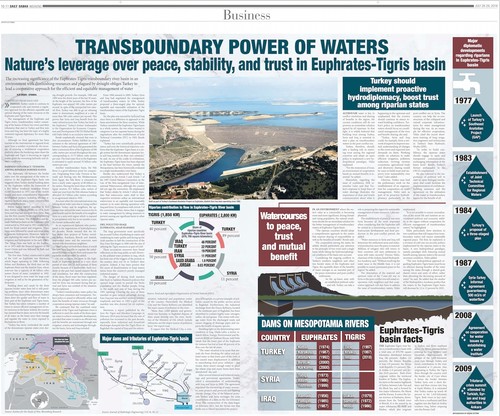
The management of the Euphrates and Tigris rivers, transboundary waters consisting of the basins of these two rivers and their tributaries that start in Turkey and flow into Syria and Iraq, has been the topic of a highly contested regional diplomacy for more than 50 years.
Although no final agreement has been reached at the international or regional level, apart from a number of protocols, the necessity of ensuring a multilateral cooperation platform where the bordering states share the Euphrates and Tigris is becoming an urgent matter given the worsening hydraulic and climatic conditions.
Dammed diplomacy: Tensions among riparian border states
The diplomatic rift between the border states over the management of the water resources in the Euphrates-Tigris basin was triggered when Turkey started building dams on the Euphrates within the framework of a $32 billion Southeast Anatolian Project (GAP) launched in 1977, one of the world's largest and most comprehensive sustainable development projects including efficient irrigation methods and a water infrastructure development scheme.
Before Turkey started operating its first dam Keban on the Euphrates in 1974, both Syria and Iraq had also built their dams. Iraq was the first country to develop engineering projects in the basin. The Al Hindiya and Ramadi-Habbaniya dams on the Euphrates were constructed in 1914 and in 1951 respectively, both for flood control and irrigation. These dams were followed by canals and more dams to generate hydropower. Moreover, Syria began exploiting the water of the Euphrates for irrigation and hydropower in the early 1960s. The Tabqa Dam was built on the Euphrates in 1973 with the financial support of the Soviet Union and was followed by Bath and Tishreen Dams.
The first dam Turkey constructed as part of the GAP on Euphrates was Karakaya, which began operating in 1988. Following Keban and Karakaya, the third dam on the Euphrates River was the Atatürk Dam, whose reservoir has a capacity of 48 billion cubic meters (bcm) of water, completed in 1992. It was designed to store water for large-scale irrigation as well as for the generation of hydropower.
Building dams and canals by the three riparian border states have led to still-pending problems since other downstream states Syria and Iraq claimed that upstream Turkey's dams deter the quality and flow of water in their part of the Euphrates and Tigris basin. But Turkey has taken initiative a number of times to ensure efficient management of water resources in the basin. Indeed, the country has claimed that its dams serve for the benefit of all states on the basin since they manage and regulate the water in rivers exposed to fluctuations in flows.
"Turkey has never overlooked the needs of the downstream riparian states even during drought periods. For example, 1988 and 1989 were the driest years of the last 50 years. At the height of the summer, the flow of the Euphrates was around 100 cubic meters per second. In spite of the unexpected low natural flow, Turkey was able to go on releasing water to downstream neighbors at a rate of more than 500 cubic meters per second. This proves that Syria and Iraq benefit from the water infrastructures that Turkey has built on the Euphrates," Turkey's former Ambassador to the Organization for Economic Cooperation and Development (OECD) Mithat Rende told Daily Sabah in an exclusive interview.
Rende emphatically stressed that even in dire circumstances Turkey fulfilled its commitment to the informal agreement of 1987 between Turkey and Syria that guaranteed the latter a minimum flow of the Euphrates of 500 cubic meters per second throughout the year, corresponding to 15.75 billion cubic meters per year. The total water flow in the Euphrates is estimated to reach around 35 billion cubic meters per year.
Another transboundary basin, the Nile River is a good reference point for comparison. Originating from Lake Victoria in Burundi and flowing into the Mediterranean from Egypt, the Nile River is estimated to have a yearly water capacity of 88 billion cubic meters. Having the lion's share of the river, Egypt receives 55.5 billion cubic meters of water per year from the Nile whereas Sudan is allocated 18.5 billion cubic meters according to an agreement inked in 1959.
At a time when the international arena was talking about water wars due to rising conflict between Turkey and its neighbors, the upstream state utilized the water resources for its own benefit and for the benefit of its neighbor Syria in a semi-arid region which is exposed to precipitation only five to six months a year, the former ambassador said.
As an experienced diplomat who participated in the negotiations of hydrodiplomacy for decades, Rende stressed that the billion dollar dam projects of Turkey including Keban, Karakaya, Birecik and Atatürk, impounded water and the reservoirs were shared with downstream neighbors.
"Had Turkey not built these dams, it would not have been possible to regulate the unbalanced fluctuations in the flows and ensure the equitable share of water," he added.
On one occasion, the snow in the highlands of Euphrates melted in a very short period of time like 10 days instead of three months because of a southwester. Such incidents in the past had caused massive floods and inundation, but after the construction of the dams, flood water has been regulated. Even the pledged 500 cubic meters per second for Syria was increased during that period and Syria was notified of the situation, Rende explained.
"Turkey's transboundary water policy has always been consistent and transparent. Turkey's policy is aimed to efficiently utilize and share the benefits of water resources through cooperation among riparian states," he said.
He continued that the combined water potential of the Tigris and Euphrates rivers is sufficient to meet the needs of the three riparian states to achieve sustainable development, provided that water is used in an efficient way and the benefits are maximized through new irrigation systems and technologies throughout the basin, Syria and Iraq included.
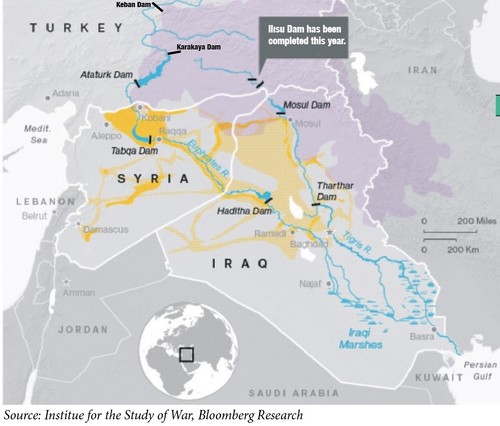
From 1984 onward to 2009, Turkey, Syria and Iraq had negotiated the management of transboundary waters. In 1984, Turkey proposed a three-staged plan for optimal, equitable and reasonable utilization of the transboundary waters of the Euphrates-Tigris basin.
Yet, the plan was rejected by Syria and Iraq since there is a difference in approach to the basin area between the three countries. While Turkey considered the Euphrates-Tigris basin as a whole system, the two others wanted to categorize it as two separate basins during the negotiations after the establishment of Joint Technical Committee (JTC) in 1983, Rende explained.
"Turkey has even scientifically proven its stance and even the historical trajectory confirms that the Euphrates-Tigris basin is a single system but the downstream riparians Syria and Iraq insisted on their own solutions," he said. As one of the cradle of civilizations, the Euphrates-Tigris basin has been depicted as the land between the rivers, namely the Mesopotamia, has been historically evaluated as a single transboundary river basin.
Render also underscored that Turkey is committed to the Article 5 and Article 7 of the 1997 United Nations Convention on the Law of the Non-navigational Uses of International Watercourses, although the country did not sign the convention. He emphasized that Turkey abides by Article 5 which stipulates that watercourse states shall in their respective territories utilize an international watercourse in an equitable and reasonable manner in its water-sharing operations with Iraq and Syria. In compliance with Article 7 of the convention, Turkey claims that it engages in water management by taking measures to prevent causing any significant harm to other riparian states.
Dry, polluted Iraqi Euphrates, Arab marshes
The Iraqi government more specifically has accused Turkey of polluting its waters and weakening its water quality and drying up the Arab marshes to halt the construction of the Ilısu Dam that began in 2006 with the aim of utilizing the Tigris resources as part of GAP.
These accusations moreover have found reflections on the Iraqi public as well. However, the polluted water problem in Iraq, which has been one of the triggers of the protests in the country, does not lie in Turkey's dam projects. Indeed, it has been proven that the cause of desalinization in Iraqi waters stems from the country's poorly managed industrial wastes.
The danger of drying Arab marshes date back to Saddam Hussein's policies that opened large canals to punish the Shiite population and the Madan people, living in the south and east of Iraq during the 1991 uprising. Clearing the area of these marshes to gain tactical advantage during Iran-Iraq war was another method Saddam employed, and later in 1985 a part of the marshes was also drained for oil exploration.
Moreover, a report published by the Save the Tigris and Marshes Campaign in February 2018 puts forward that the rate of pollution has increased in the past decade, especially from industrial and household discharges dumped into the Tigris River in Baghdad, the capital of Iraq and the administrative, industrial and population center of the country. Particularly the Medical City and the Daura Refinery are identified the main causes of pollution in the river.
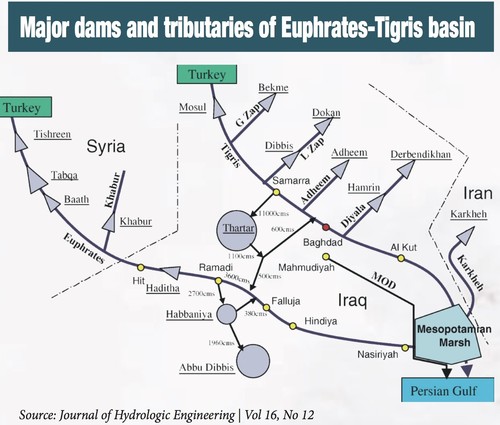
"More than 2,000 private and government-run factories in Baghdad dispose of their waste directly into the river. Facilities of the Ministry of Oil, which include refineries, are the major source of pollution here," the report read.
It argues that the Medical City, a complex of hospitals, is a prime example of pollution caused by the public service sector in Baghdad. Furthermore, the industrial discharge from the Daura Refinery, located in the southeast part of Baghdad, has been identified to contain highly toxic nitrogen, sulfur, oil and grease. This mixes with sewage water from the discharged waste and causes clogging of drainage pipes and impacts the health of aquatic species.
Shedding light on the deteriorating water condition in Iraq, Glada Lahn, a senior research fellow, Energy, Environment and Resources (EER) at Chatham House, told Daily Sabah that the lower part of the Euphrates for instance has lost at least 40 percent of its flow over the last 40 years.
"The water situation is so acute that animals die from drinking the saline and polluted water in that lower part of the river, it has caused mass displacement in addition to exacerbating food price inflation – last winter, there wasn't enough water to plant the wheat crop and many farms have been abandoned," she said.
After several bilateral and trilateral meetings and provisional agreements, Turkey inked a memorandum of understanding with Iraq and Syria in 2009. The agreement stipulated the monitoring of water resources, joint projects and protocols and fighting climate change. One of the bilateral protocols Turkey and Syria envisages the joint construction of a dam on the Asi (Orontes) River. The construction of the dam began on February 2011, but the Syrian war that broke out in March has halted the project.
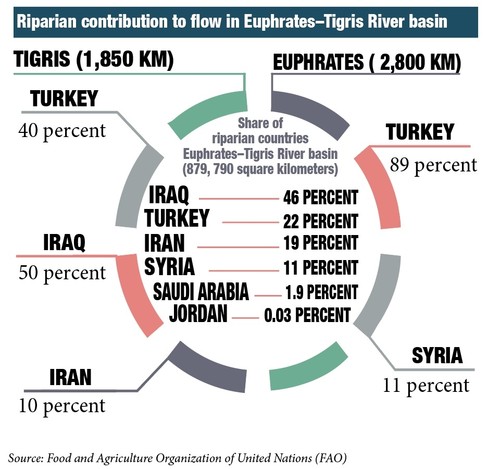
Turkey should implement proactive hydrodiplomacy, boost trust among riparian states
Although water is key to conflict resolution and sharing of benefits in the region, the current conditions still do not promise an immediate solution agreed by all riparians. In that light, it is widely believed that building trust among Turkey, Syria and Iraq is essential to start a plan on transboundary waters in the post-conflict era.
Turkey, therefore, should, take a leading role in restoring trust among the regional countries and adopt an open policy to implement a new hydropolitical paradigm, Yıldız explained.
"For the restoration of trust, an environment of cooperation based on mutual benefits is essential," he added.
Meanwhile, regarding the issue of confidence, EER researcher Lahn said that Turkey's response to Iraq's fears of water shortage illustrates the importance of clear and timely communication about what is happening in the upstream and emphasized that the country should continue its stance toward building confidence. Turkey's policy on transboundary waters should focus on coordinated management of the river and benefit-sharing, she said.
"Turkey, Syria and Iraq could, for example, form a network of experts to improve mutual understanding of changes in the rivers and expected new demands on them. Working jointly on solutions to make efficient irrigation, pollution reduction, reviving riverine ecosystems, agricultural trade and electricity sharing would be ways to build trust and improve river sustainability over time," Lahn added.
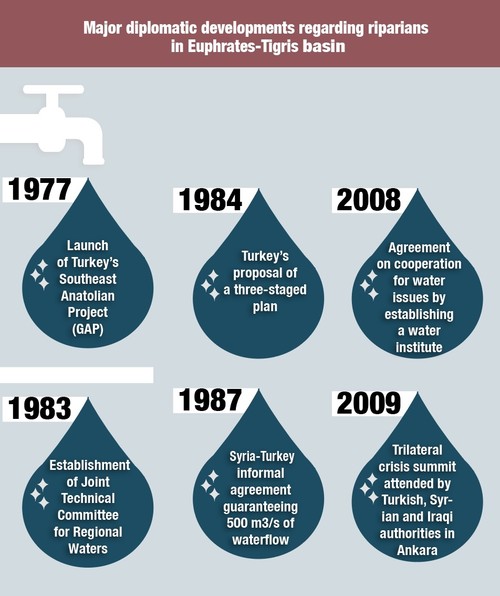
Likewise, Turkey may lead the preliminary work on the establishment of an organization for cooperation on water management, Yıldız said, as part of its proactive hydrodiplomacy particularly in the post-conflict era in Syria. The country can help the re-construction of the collapsed and ruined corporate infrastructures for water management during the war. As an example for effective cooperation, Yıldız cited the recent short-term training of Iraqi irrigation engineers and technicians in Turkey's State Hydraulic Works (DSİ).
"In order to build confidence, the riparian states should engage in open and transparent communication, exchanging information at the basin level," Rende, Turkey's former ambassador to the OECD, emphasized.
He also referred to the importance of political will to start an open dialogue mechanism that could facilitate the implementation of confidence-building measures and the agreement on the utilization of the water in transboundary basins for the benefit of all.
Watercourses to peace, trust and mutual benefit
In an environment where the water's value as a commodity is becoming more and more significant, drying climate and rising population, the natural conditions dictate for an immediate solution for the better management of transboundary waters of Euphrates-Tigris basin.
"The riparian countries should adopt a comprehensive approach to the matter that requires sharing of responsibility as well as the benefits of wealth," Rende said.
The cooperation among the states, he added, should particularly pay attention to the principle of two rivers and a single basin while taking the hydromorphological conditions of the basin into account.
Considering the ongoing conflicts in Turkey's southern neighbors and other two border states of the Euphrates and Tigris, the equitable share of the benefits of water emerges as an essential part of the peace-restoration and post-conflict settlements.
As the up-basin state with an established political order and will, Turkey can take a role in preparing the region for sustainable management of water resources, Lahn emphasized.
The establishment of peace in war-torn Syria becomes all the more important when considering that the Euphrates will be central to a functioning economy, infrastructure development and food production in the post-conflict period, she added.
"Water resources in Syria and Iraq will determine the settlement areas and industrial production once the peace is restored. Millions of refugees who will return to their countries will start settlements in areas with water security," Dursun Yıldız, chairman of the Ankara-based Hydropolitics Academy, said. "Without resolving the water issue in the Middle East, it is not possible to ensure permanent peace in the region," he added.
The elimination of the material and spiritual ruins of the 7-year-old war in Syria in the post-conflict era will entail cooperation with neighbors and that cooperative approach will also have to address the issue of transboundary waters, Yıldız emphasized.
"It is not possible to ensure normalization of the social life and institute an environment political and economic stability in the region without cooperation for efficient management of transboundary waters," he highlighted.
Yıldız particularly drew attention to two conditions that will impact how transboundary waters will ensure sustainable regional peace. The first, he explained, is a revision of cold-war era security politics implemented by the riparian states in the basin. A new hydropolitical paradigm, namely paradigm shift, featuring mutual benefit among riparian states is the second necessary condition, Yıldız added.
"The new hydropolitical approach regarding Euphrates-Tigris basin must focus on efficient sharing benefits of the water among the states through a shared goal, shared vision and unity of effort, rather than allocating the decreasing amount of water," he said. He added that the studies of the Hydropolitics Academy predict that the waters in the Euphrates-Tigris basin will decrease by 12 to 15 percent by 2035.
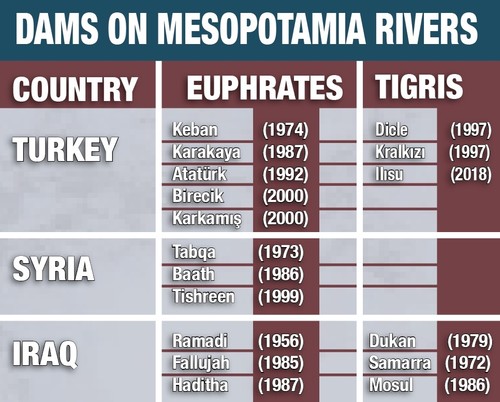
Euphrates-Tigris basin facts
The Euphrates-Tigris river basin is a transboundary basin with a total area of 879,790 square kilometers distributed between Iraq (46 percent), Turkey (22 percent), the Islamic Republic of Iran (19 percent), the Syrian Arab Republic (11 percent), Saudi Arabia (1.9 percent) and Jordan (0.03 percent). Both rivers originate within the territorial borders of Turkey. The Euphrates starts in the eastern highlands of Turkey, between Lake Van and the Black Sea, and is formed by two major tributaries, the Murat and the Karasu. It enters the Syrian territory at Karkamis, downstream from the Turkish town of Birecik. It is the joined by its major tributaries, the Balık and Khabur, which also originate in Turkey, and flows southeast across the Syrian plateaus before entering the Iraqi territory near Qusaybah. Approximately 89 percent of the 3,000-kilometer river runs through Turkey and Syria's contribution to the river is estimated at 11 percent. Also originating in Turkey, the Tigris flows through the country until the border city of Cizre where it forms the border between Turkey Syria over a short distance and then crosses into Iraq at Faysh Khabur. It is estimated that Turkey makes up nearly 40 percent to the 1,418-kilometer Tigris. Both rivers in fact naturally form a confluence and flow together into the Shatt-al-Arabin southern Iraq, before emptying into the Persian Gulf.
